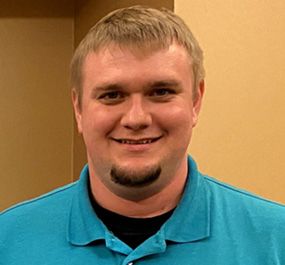
Figuring out how things work comes naturally to Greg Cresswell, who runs the GW Cancer Center Flow Cytometry Core Facility. When he’s not helping scientists across campus with studies ranging from cancer biology to frog immunology, he’s designing and building gadgets with his 3D printer. Getting to the nuts and bolts of the matter is just part of his day, every day.
What’s your story?
I grew up in Shelbyville, a small farming town in central Illinois. It’s a town of about 5,000 people andthere were maybe 100 people in my high school. My family mostly worked as farmers and in manufacturing. At a generational level, I’m the first to go to a four-year university. I studied microbiology at Southern Illinois University at Carbondale. I ended up in biology because I really didn’t like math and figured I could avoid it in biology — that was not the case unfortunately.
After Carbondale, I went to Purdue for grad school and stayed on the biology track with a focus on cancer immunology. That’s when I got interested in flow cytometry and involved in a lot of flow-heavy projects. I was doing enough flow work the Purdue flow lab essentially told me they were tired of seeing me and running my samples on the sorter, so they taught me how to run my own projects. I ended up being our lab’s point person: running everyone’s flow and teaching people how to use the equipment. I stuck around Purdue to finish up a few projects as a postdoc and then came here to GW in 2021.
I like to figure out how things work, understanding the nuts and bolts, tinkering with machines. Biology and flow cytometry really brings the two disciplines together in a way that’s really fulfilling. Technically, I work with departments across the GW campus, so I’m working with teams that have NIH-funded projects and other teams that are funded by NSF. I get to see a wide range of projects that really makes the job fun and engaging. It’s very creative and challenging work.
What gets you out of bed in the morning?
My family. My wife is my high school sweetheart and she’s been with me the whole way of this complicated journey. We have a son in first grade, so watching my family grow is really what motivates me. My son is in first grade, and it has been a lot of fun to watch him grow and learn. He still has that childlike wonder but now he’s becoming more creative and it’s fun to watch his brain work things out. I always have those parenting moments when I think I have it all figured out and then he surprises me.
What is that one book that has influenced you the most?
It’s not one book as much as it’s one author: Stephen King. I bonded a lot with my extended family because we were all reading his books. We ended up having this impromptu Stephen King book club. I have a lot of fond memories from that time in my life. Stephen King and Game of Thrones audiobooks really got me through the more tedious parts of grad school.
From a professional standpoint, The Emperor of All Maladies (Siddhartha Mukherjee) and The Immortal Life of Henrietta Lacks (Rebecca Skloot) had a lot of impact on me. The first is the history of why we do this work, and the second is how we do science, the ethics behind our work, how we treat patients, and that biology is ultimately attached to a human.
What absolutely excites you in cancer research right now?
My science bias has always been immunology and it’s nice to see immunotherapy taking a more prominent role in clinical trials and clinical research. As researchers, we’re evolving from focusing solely on the cancer cell to now examining how various factors interact with it. It’s fun to see the evolving technologies with flow cytometry. Basically, flow is a technique used to analyze the physical and chemical characteristics of cells as they flow in a single file line in front of a laser beam. When the cells pass through the laser, information about the cells is collected that helps us to identify and quantify different cell types, assess cell size, and detect specific markers either internal or external on the cell. Flow technology has advanced and now the instruments have more lasers and more detectors. We have image-based cytometers that provide actual physical images. Flow is an impressive and complicated process with everything happening in a fraction of a second. It’s very exciting technology.
What is the most interesting thing we should know about you?
As I said earlier, I married my high school sweetheart. We dated for ten years and have been married for ten years, so we’ve been together longer than we haven’t. I also have a lot of nerdy hobbies that are somewhat thematic. They all center on tinkering with things to figure out how they work. I have a huge collection of Star Wars Lego® sets. I just got a 3D printer that I’ve been playing with. I make toys for my son and little fidget spinners for my wife’s second grade students. I build my own computers, and even the wallpaper on my work computer is Star Wars, so yes, there’s a running theme. And I love that my son is showing an interest in tinkering and building things. He loves Legos®, too, and builds these little creations that he tells us about. It always makes me smile.



